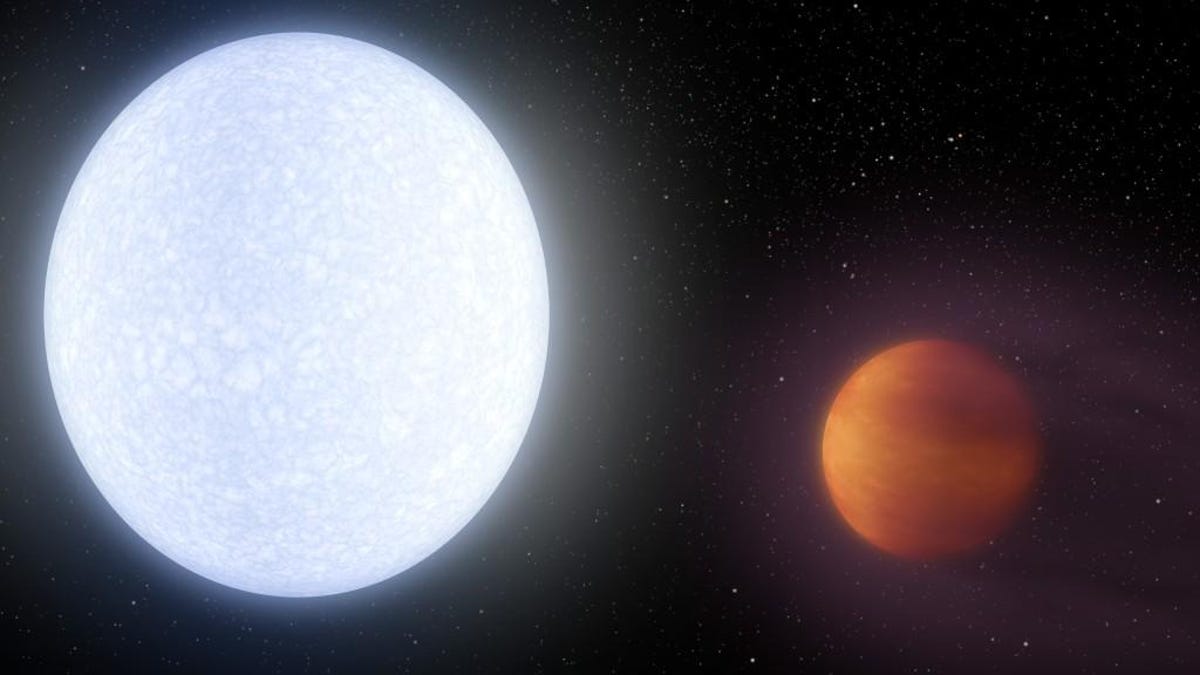Super hot planet bigger than Jupiter might be disappearing
Astronomers spot an extreme world that might be in the process of slowly evaporating, but for now the gas giant has plenty of fuel to blow our minds.

An artist's conception of the KELT-9 system.
Truth is stranger than fiction, the saying goes, but the more we explore space, the more we find worlds stranger than even the strangest science fiction.
The latest weird world to be discovered is a gas giant almost three times more massive than Jupiter that's so hot it may be in the process of evaporating. That's a bummer for interstellar extremophiles looking for a new home to test their mettle, but it could be producing a nifty glowing tail just like a comet.
You can see roughly what the planet looks like in its close orbit of the massive star KELT-9 in the brief animation below.
Using a "Kilodegree Extremely Little Telescope," an international team led by astronomers at Ohio State and Vanderbilt universities spotted the planet, KELT-9b, passing in front of the star every 1.5 days. This close orbit helps explain what makes it boil at more than 7,800 degrees Fahrenheit (4,315 degrees Celsius), which is hotter than most known stars and only about 2,000 degrees cooler than our sun.
KELT-9 is also an undeniable force to be reckoned with, located 650 light-years away in the constellation Cygnus where it sears at almost twice the temperature and size of our own star.
"KELT-9 radiates so much ultraviolet radiation that it may completely evaporate the planet," Vanderbilt's Keivan Stassun said in a release. "Or, if gas giant planets like KELT-9b possess solid rocky cores as some theories suggest, the planet may be boiled down to a barren rock, like Mercury."
The team has published a paper describing the planet in the journal Nature and is also presenting it this week at a meeting of American Astronomical Society in Austin.
While the planet is huge, it's also only half as dense as Jupiter because the radiation blast it gets from KELT-9 puffs its atmosphere up like a balloon.
If any tardigrades or other extremophiles did ever make their way to this hellish place, they'd likely have to move on or stick to exploring the planet's dark side. That's because it's tidally locked to its star with the same side always facing it, just like the moon does to Earth. This makes the day side so hot that life-supporting molecules like water, carbon dioxide and methane can't even form.
"The long-term prospects for life, or real estate for that matter, on KELT-9b are not looking good," Stassun said.
Fortunately, we've compiled our own list below of places across the cosmos that might make for just slightly more favorable speculative investing over the absurdly long term.
Technically Literate: Original works of short fiction with unique perspectives on tech, exclusively on CNET.
Crowd Control: A crowdsourced science fiction novel written by CNET readers.

